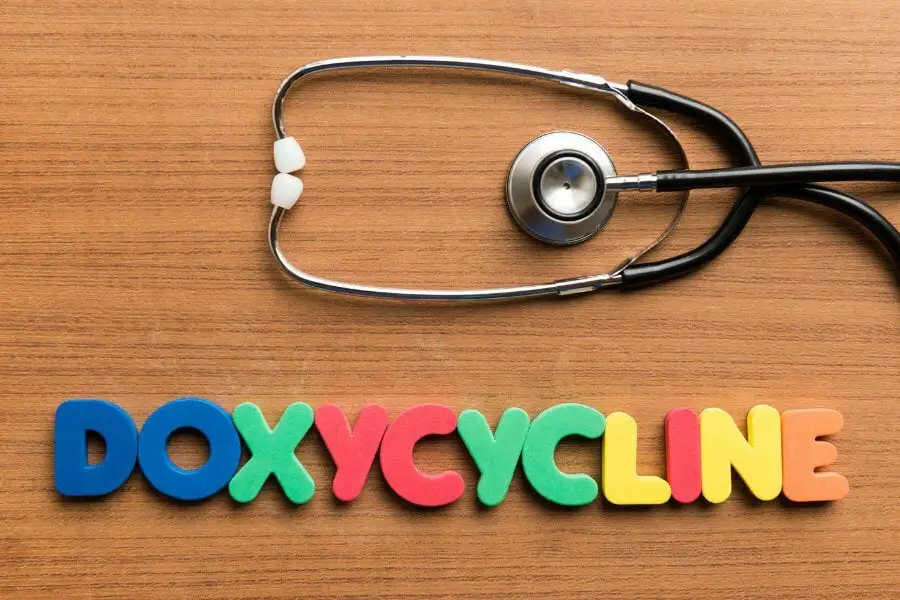 Did your veterinarian prescribe Doxycycline Hyclate for your dog? Not sure what exactly this medication is? Was it necessary?
Did your veterinarian prescribe Doxycycline Hyclate for your dog? Not sure what exactly this medication is? Was it necessary?
In this article, we’ll cover everything you’d need to know about Doxycycline Hyclate for dogs and why your veterinarian has prescribed it to your beloved pooch! We will go into great detail about the usage of Doxycycline Hyclate for dogs and how much is typically prescribed.
What Is Doxycycline Hyclate For Dogs
If you’ve ever had any kind of bacterial infection, then it’s very likely that your doctor has had to prescribe antibiotics to you before. You see, in order to prevent bad bacteria from flourishing, antibiotics are needed to kill bacterial cells.
In the veterinary world, Doxycycline Hyclate is classed under the tetracyclines and it is a commonly used broad-spectrum antibiotic used to treat all sorts of bacterial infections. The way Doxycycline works is that it actually prevents and completely stops the formation of bacterial cells by changing the composition of the bacterial cell wall.
What Is Doxycycline Hyclate For Dogs
Today veterinarians often prescribe doxycycline to treat animals that may have a bacterial infection or an animal that may be prone to infection. Doxycycline is effective against conditions such as
- Rickettsia
- Lyme disease
- Leptospirosis
- Rocky Mountain Spotted Fever
- Urinary Tract Infections
- Toxoplasmosis
- Chlamydia
- and other bacterial infections.
The Role of Doxycycline for Dogs with Heartworm
Heartworms are a common problem pet owners often face in the United States. This is often a fatal disease that causes severe blockage and damage to our pet’s heart and organs.
In 2008 a study looked at the efficacy of doxycycline and ivermectin (another antibiotic) for the treatment of heartworm.
It was found that an organism called Wolbachia inhabited the heartworm parasites. When researchers used doxycycline in-conjunction with ivermectin, they noticed that the drug was able to eliminate Wolbachia and thus kill off heartworms.
Doxycycline For Dogs with Ear Infections
If you think your pooch has an ear infection then you might be a little tempted to administer some of your left-over doxycycline antibiotics instead of taking them to the vets.
We do not recommend that pet owners treat their dog’s infections with their own antibiotics. This is because:
- Pet owners may not be able to distinguish if there is a bacterial infection or fungal infection.
- If your dog has any inflammation that you don’t catch then he is going to need a dose of NSAID or steroids along with the proper antibiotic treatment.
- Pet owners may not know the correct dose and duration of the treatment period.
- Veterinarians may choose antibiotics better suited to treating your dog’s ear infection. This can include gentamicin or amoxicillin.
Nevertheless, doxycycline could potentially be a good antibiotic for dogs with ear infections. Currently, there is not much research available about the use of doxycycline for dogs with ear infections.
Doxycycline for Lyme Disease in Dogs
If you live in the United States, then you’ve probably heard of the in-famous tick-borne disease known as Lyme disease. Lyme disease is caused by a bacteria known as Borrelia burgdoferi and it can indeed be transmitted to humans. But, rest assure Lyme disease is not zoonotic. This means that your pet cannot spread the disease to you.
According to a study done in 2015, three different classes of antibiotic treatments were tested in order to determine the efficacy of each against Lyme disease. It was concluded that doxycycline can indeed kill bacteria well.
Doxycycline Dosage for Dogs
In 1988 a study was done in order to understand the pharmacokinetics and required dosage of doxycycline in dogs & cats. The study concluded that in order for the drug to be effective, a dosage of 10mg/kg/ day was needed to be administered once every 24 hours.
Is Doxycycline Safe for Dogs
Doxycycline Hyclate is an antibiotic most commonly used in human medicine. This means that the FDA has not yet approved it for the use of our pets.
However, various clinical trials and research have demonstrated that Doxycycline Hyclate can be safely used on our pets when the right dose is administered. However, a recent study suggests that doxycycline should not be used on pregnant dogs due to the possibility of it causing congenital malformations.
Doxycycline for Dogs Side Effects
One thing pet owners need to be aware of is that doxycycline is not FDA approved for use in veterinary practice. Nevertheless, it is still an excellent drug that works on all sorts of bacterial infections.
It’s important to keep in mind that every drug will have some sort of side effect. This is because no drug is perfect & every dog is physiologically different.
Some common side effects your dog may have from consuming doxycycline may include:
- Vomiting
- Anorexia
- Diarrhoea
- Difficulty swallowing
A study done in 2011 looked at the potential side effects doxycycline can have on dogs. From a population size of 386, 18.3% of dogs experienced episodes of vomiting, 7% had developed diarrhea and 2.5% developed anorexia.
Other minor side effects include:
- Teeth staining: such that doxycycline seems to bind to calcium on a young dog’s teeth causing the teeth to go yellow.
- Changes in pH level of the dog’s throat which can occur if the pill is not swallowed properly.
Rare side effects include
- Changes in ALT & ALP activity and changes in blood chemistry.
Doxycycline for Dogs Cost
The cost of Doxycycline Hyclate is variable depending on where you choose to buy it. Since this Doxycycline is an antibiotic it can only be purchased by a veterinarian or may require a veterinary prescription. In the US market the average costs are as follows:
On PetMed Express, the average cost of doxycycline starts at $61.19.
On VetRxDirect, the cost of doxycycline is based on each tablet. For example, 2-mg of Doxycycline Hyclate can cost up to $0.55 per tablet, or a 100 mg dosage can cost up to $1.37 per tablet.
On medi-vet, the average cost of a 100 mg dosage consisting of 500 tablets is $10.37.
Miss a Dose?
As soon as you remember that you forgot to give your dog a dose, give it to your dog right away. If it is already really close to the next dose, then you will want to skip the dose that was forgotten and go onto the next dose.
Please do not give your dog two doses at the same time; it is not safe at all. If you are still concerned about what you should do if you missed a dose, then consult your veterinarian for guidance.
It is very important to keep your dog on a regular dosing schedule, and you try your best not to miss giving your dog a dose. Set an alarm in your phone that will alert you when it’s time to give your dog the medicine.
How to Store Doxycycline Hyclate For Dogs
You will want to keep the Doxycycline Hyclate that you get for your dog in its regional air-tight container. It should be stored in direct light or heat. You want to keep the medication at room temperature.
If your dog is using the liquid medicine, it is important to use the recommended amount from your vet for the required number of days. Once your dog is finished with the vets dosage, you will want to discard the rest. This can also be stored safely at room temperature.
Final Thoughts
Doxycycline Hyclate is an antibiotic often used in human medicine. However, as there are now very few FDA-approved drugs available in veterinary medicine, many veterinarians turn to human drugs to treat various bacterial infections; Doxycycline Hyclate is one such drug.
Do you have any questions about Doxycycline Hyclate? Leave us a comment below.


My dog is on this but a week after she quits taking it, the infection comes.. She has strep and ecoli and ear infection. The vet says she cant keep giving it to her. Is there some other thing my dog can take for a extended amount of time to get rid of this stuff. If the vet could keep he on something for a few months I think that would solve the problem. The longest she was on this was 2 weeks. Please reply thanx